Tod Allman gives a presentation at Wycliffe's Bible Translation Conference
October 17th, 2023.
Every other year Wycliffe Bible Translators hosts a large Bible translation conference at their headquarters in Dallas, TX. People from many different Bible translation organizations come from around the world, and many more people watch the presentations virtually. This year nearly 950 people attended. Numerous presentations covering a wide range of topics related to Bible translation were given during the four day conference. Tod gave a presentation entitled "TBTA: A Natural Language Generator based on Linguistic Universals, Typologies, and Primitives." About 35 people attended in person, and another 65 people watched online. A recording of the presentation is available at the button below. As you can see in the video, Tod had the privilege of being introduced by Moses.
Video: Tod's Bible translation conference presentation
Tod Allman answering questions after his presentation at Wycliffe's Bible translation conference
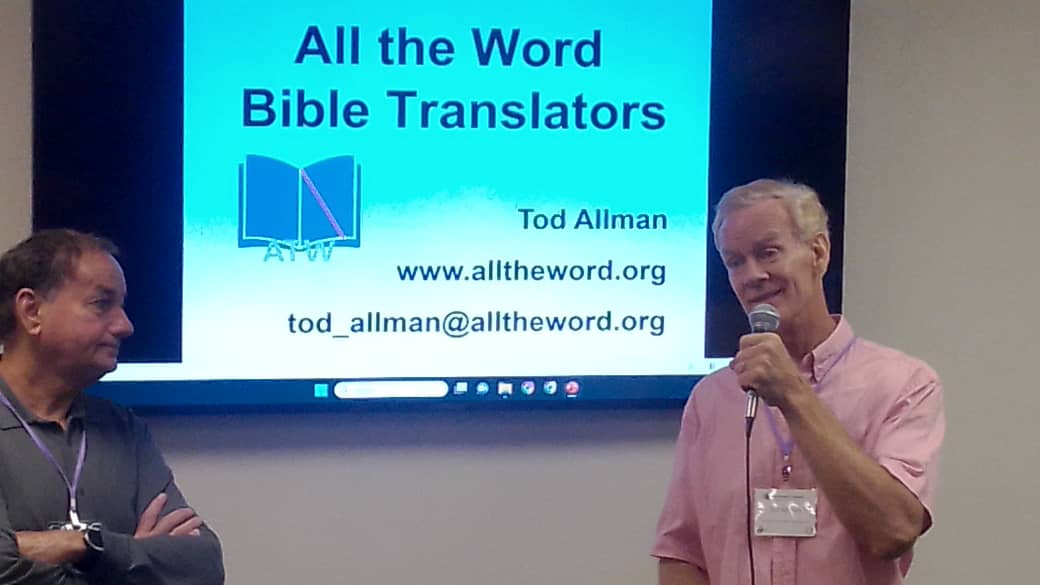
Craig Palmer and David Duncan visit Kenya again
September, 2023.
In late September Craig Palmer and David Duncan flew to Kenya again to visit the Gichuka translators. They were excited to visit the Chuka town and the surrounding area. They met with Anthony Muthomi, the mother-tongue speaker that Craig works with online, and the rest of the translation team. They also observed the community checking Genesis 37, which was drafted using TBTA. Everyone was impressed with the quality of the draft, and the discussion was mainly about minor naturalness issues. Anthony also gave a tour around the area, and his family welcomed Craig and David warmly with lunch and cultural dances! After working with and analyzing the Gichuka language for more than a year, hearing it being spoken in a real-life context really brought it to life for Craig. And seeing how excited the community is to have God's Word in their language was extremely encouraging! In Nairobi, Craig and David met again with the leaders and staff of BTLKenya (Bible Translation and Literacy - Kenya), the national led translation organization in Kenya, to present TBTA and how it can be used to serve them. They were all impressed with the results in Gichuka, and excited to use TBTA for many future projects.
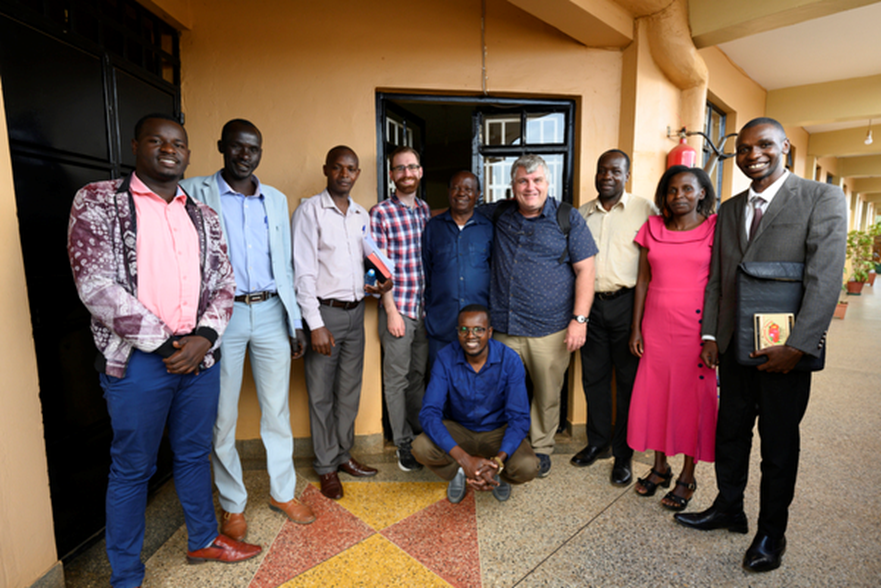
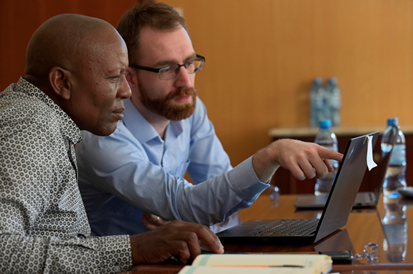
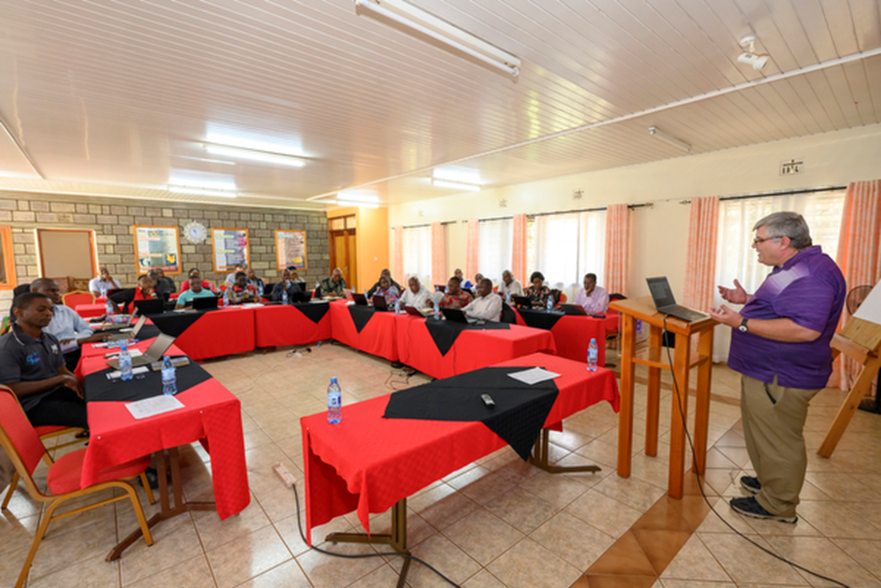
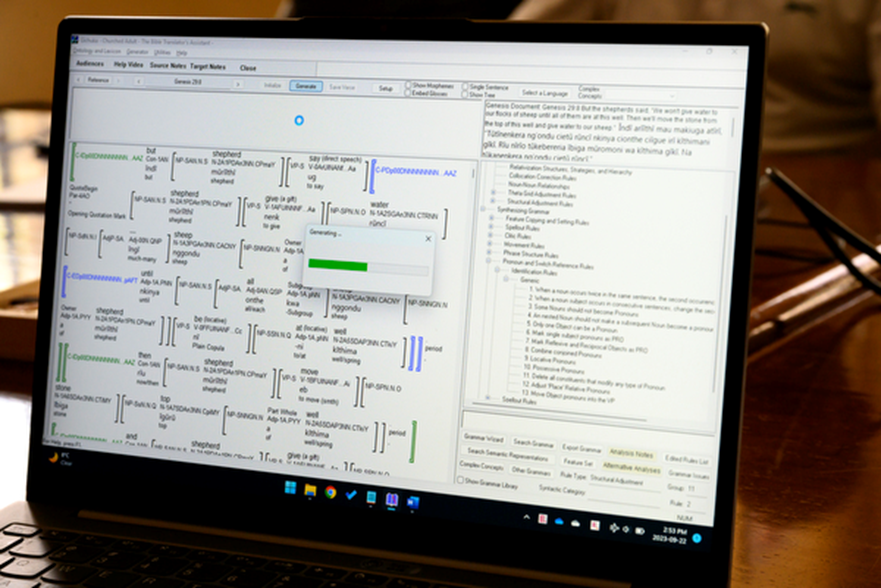
The book of Ruth has been translated into two more languages
June, 2023.
In early 2023 Matthew Bayliss, a member of Wycliffe-New Zealand, started working through the book of Ruth for a language spoken in S.E. Asia. At about the same time Tod Allman started working through Ruth for a language spoken in Papua New Guinea. Both Matthew and Tod finished Ruth in June, and the mother-tongue translators for their languages said that the TBTA drafts were very helpful. Spending nearly half a year on a small book like Ruth sounds like very slow progress, but Matthew and Tod had to enter numerous grammar rules for their languages into TBTA. As they continue working through more Bible books, their grammars and lexicons will become well developed, and the pace of their progress will accelerate. Matthew is now working through Genesis, and Tod is working through Esther.
An Endorsement from Kenya
January, 2023.
David Duncan and Craig Palmer visited a Bible translation organization in Kenya named Bible Translation and Literacy - Kenya (BTL-Kenya). Craig has been working with one of their members to build a lexicon and grammar for Gichuka, so he and David visited the Gichuka team in Nairobi. One of the members of the team reviewed the Gichuka drafts that are being produced by TBTA, and he made a video which you can see below. We at All the Word are praising God for the results.
Video: An Endorsement of TBTA from Kenya
Pictured below from left to right: Jacob Njagi, Anthony Muthomi, Craig Palmer, David Duncan, and Onesmus Kamwara
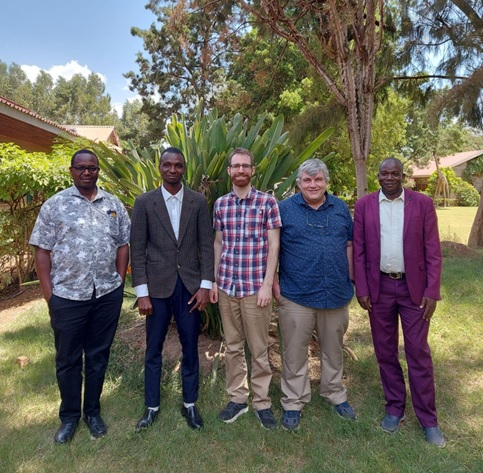
The book of Ruth has been completed in Gichuka
December, 2022.
Earlier this year Craig Palmer started working with Anthony Muthomi to build a lexicon and grammar for Gichuka using TBTA. They've now produced a draft of Ruth, and the Gichuka translation team has checked that draft for accuracy and edited it for naturalness and clarity. A picture of the team reviewing TBTA's draft is shown below. Anthony said that the first day of review was “fantastic” and that “mistakes are minimal and easy to deal with.” That is the purpose of TBTA - to produce drafts that are exegetically accurate and easily understandable so that the mother-tongue translators can quickly edit them into publishable form. Now that the team has finished editing and reviewing TBTA's draft, they'll go through the normal process of a community check and consultant check. After those checks have been completed, the book will be published. Craig and Anthony are now working through Genesis.
Craig asked Anthony to edit TBTA's draft and make it a presentable first draft, and to highlight all of his changes in red. Anthony's presentable first draft can be seen below. We define a presentable first draft as a draft that doesn't have any grammar errors and it could be read to a church audience and everyone would easily understand it. A presentable first draft isn't polished or completely natural; it still needs more editing before it's publishable. In Anthony's presentable first draft, you can see how helpful TBTA was - many of the verses only need a little editing.
TBTA's Gichuka Draft of Ruth with Edits in Red
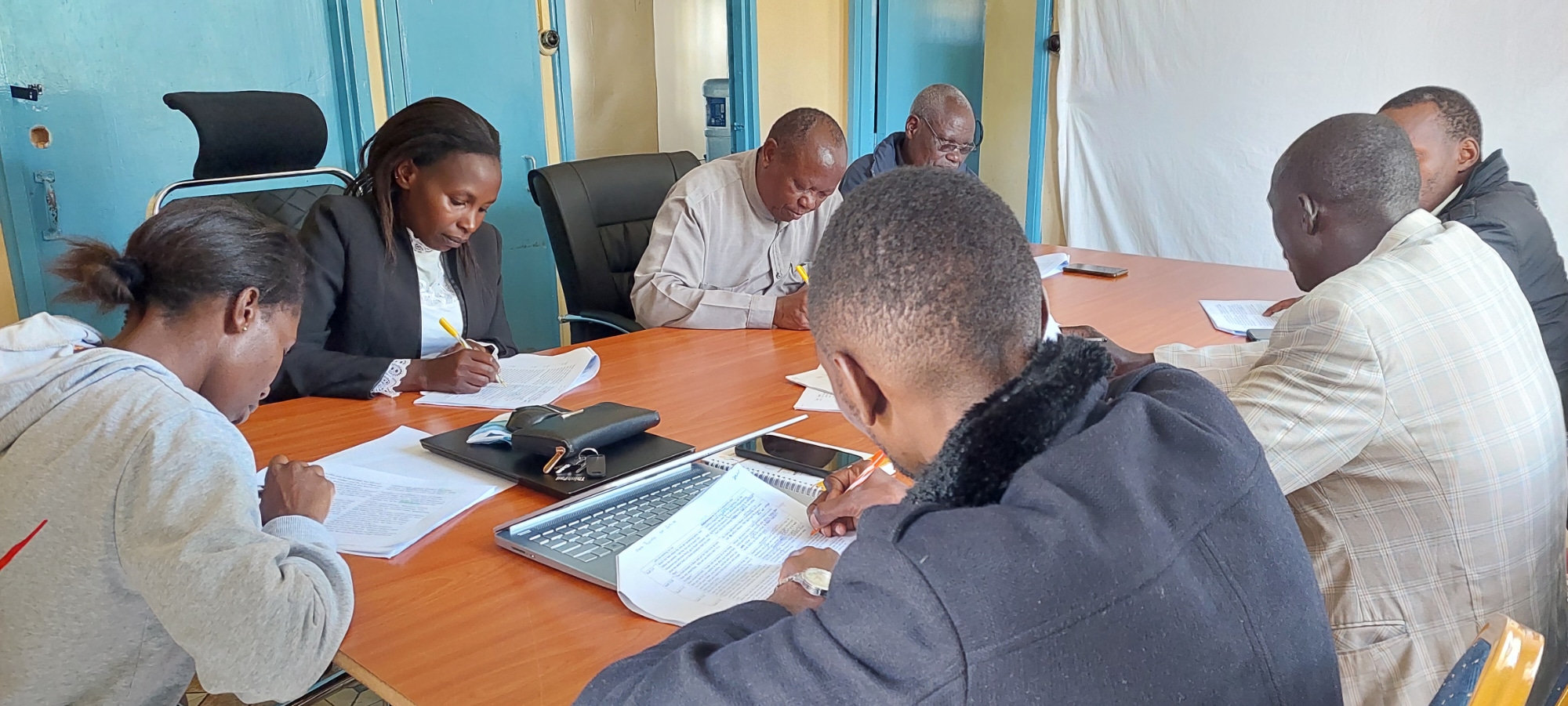
The Source Text for the Gospel of Matthew has been completed
August, 2022.
Richard Denton, David Duncan, and four members of Wycliffe-Canada recently completed the source text for Matthew. It took approximately 1,500 hours, but now our software can translate Matthew into any language that we've developed a lexicon and grammar for. The source text has been consultant checked for accuracy, conveys all of the message, includes implicit information, and has footnotes and cross-references. Two unedited English drafts of Matthew produced by our software can be seen below. The first version doesn't contain any implicit information; that version most closely resembles the translations of Matthew that all of us are accustomed to reading. The second version contains implicit information to help people who have never read the Bible before so that they can easily understand the message. The implicit information is always marked with brackets ('<' and '>') so that readers know it's not part of the inspired text. The second version also includes alternative analyses, footnotes, and cross-references. If we had a source text for every book in the Bible, our software would be able to quickly translate the entire Bible into many different languages. Please pray for the people who are building these source texts. They're now working on John, Colossians, and Proverbs.
TBTA's Unedited English Draft of Matthew without Implicit Information
TBTA's Unedited English Draft of Matthew with Implicit Information
The Gospel of Mark has been translated into a language spoken in Asia
May, 2022.
Late last year a team of translators finished building the source text for the book of Mark. Tod has been working with a translator in Asia for a couple of years now, and they've been building a lexicon and grammar for a language spoken in Asia. After the source text for Mark was completed, Tod and the local translator produced a draft of Mark in that language, and that draft is now being edited for naturalness and clarity. The edited draft will go through the customary team check, community check, and consultant check. The local Bible translator working in this language says that it's extremely difficult to find mother-tongue speakers who will help him translate the Bible because the speakers of that language are hostile to the Bible. Over 99 percent of them follow a faith other than Christianity. But he said that a few mother-tongue speakers are willing help him edit TBTA's drafts because editing is faster and easier than producing new translation drafts. So he's very appreciative of All the Word's help with this very challenging translation project. He recommends TBTA for any translators working with a people group that is hostile to the Bible. If you would like to pray for him, his local translation team, the checking and testing process, or even All the Word and their involvement, please consider subscribing to their daily prayer program at pray4thebanjar.com. You can easily unsubscribe at any time.
Craig Palmer begins building a Lexicon and Grammar for Gichuka
January, 2022.
Craig has started developing a lexicon and grammar for Gichuka, a Bantu language spoken in central Kenya. He meets online regularly with a Gichuka speaker named Anthony Muthomi, who is a member of BTLKenya (btlkenya.org). Gichuka is a fairly agglutinative language, with lots of morphology on the verb for tense, aspect, and valency-adjustment. It also has the classic noun classes of Bantu languages, which affects agreement on adjectives, verbs, and even prepositions. Two simple sentences in English and Gichuka are shown below so that you can see what an agglutinative language is like. In an agglutinative language, ideas that are separate words in English are often prefixes or suffixes that attach to the verb. In the second sentence below, English uses five words, but the Gichuka sentence has only one word.
John saw a chair. Then he sat on it.
Njũana nĩonire gĩtĩ. Akĩnagĩkarĩra.
John saw a chair.
Njũana nĩ-(a)-on-ire gĩtĩ.
John past-3SG-see-perfective chair.SG.
Then he sat on it.
A-kĩna-g-ĩkar-ĩra.
3SG-then-it-sit-applicative
All of these prefixes and suffixes are based on rules, so Craig is writing rules to make TBTA produce accurate and high quality translations in this agglutinative language.
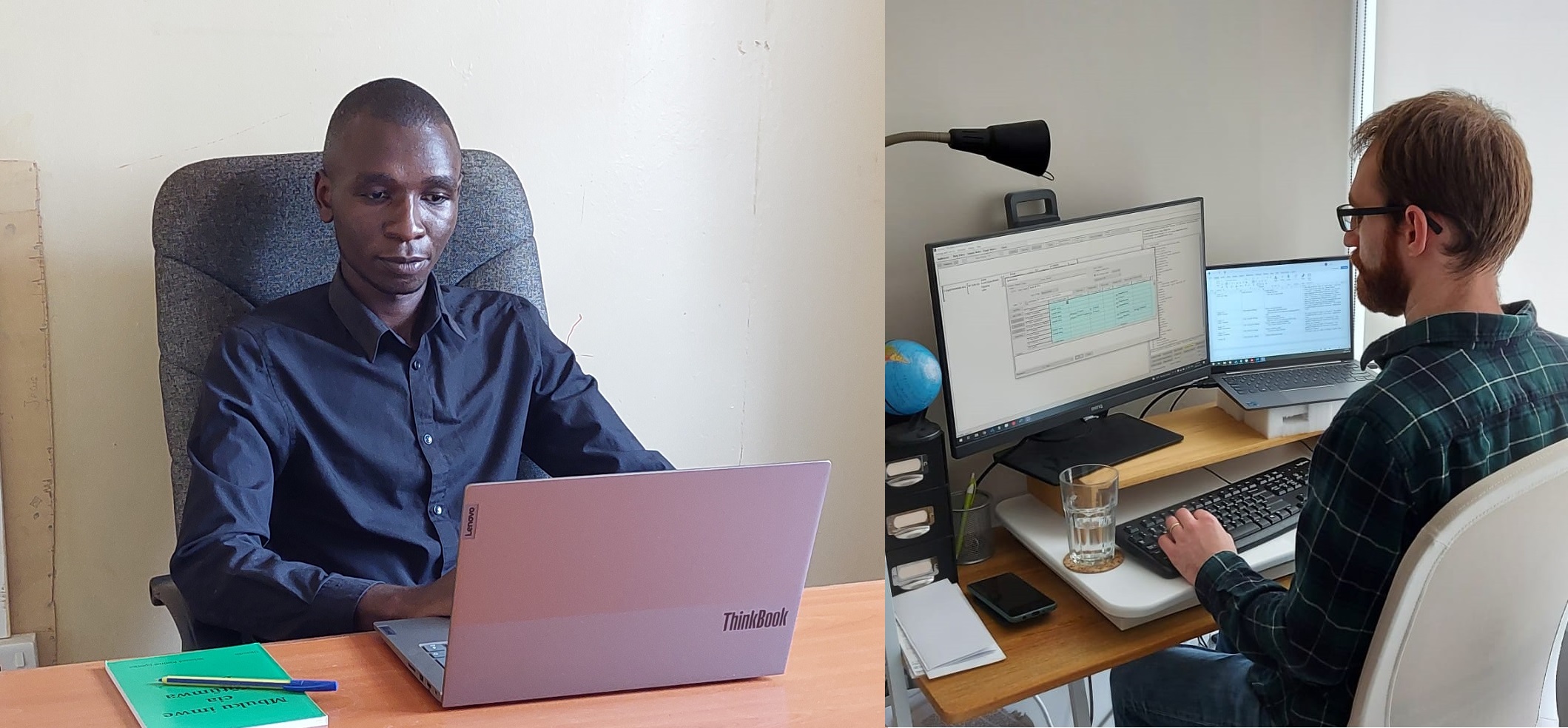
The Source Text for the Gospel of Mark has been Completed
November, 2021.
Richard Denton, David Duncan, and four members of Wycliffe-Canada have been working together to prepare the source text for Mark. It took approximately 800 hours, but the source text is now complete, and it turned out fantastic. The source text is accurate, conveys all of the message, includes an abundance of implicit information, has numerous footnotes, and even includes cross-references. Using that source text, our software is now able to produce drafts of Mark in any language for which we've developed a lexicon and grammar. Two unedited English drafts of Mark produced by our software can be seen below. The first version doesn't contain any implicit information; that version most closely resembles the translations of Mark that all of us are accustomed to reading. The second version contains implicit information to help people who have never read the Bible before so that they can easily understand the message. The implicit information is always marked with brackets ('<' and '>') so that readers know it's not part of the inspired text. The second version also includes alternative analyses, footnotes, and cross-references. If we had a source text for every book in the Bible, our software would be able to quickly translate the entire Bible into many different languages. Please pray for the people who are building these source texts. They're now finishing Matthew, and working on John, Colossians, and Proverbs.
TBTA's Unedited English Draft of Mark without Implicit Information
TBTA's Unedited English Draft of Mark with Implicit Information
Roger Stone and the Ayta Mag-indi Translators Publish and Dedicate the book of Genesis
June 9th, 2021.
In late 2020, Roger Stone and a team of Ayta Mag-indi mother-tongue translators published their New Testament. Due to the pandemic, the dedication ceremony for the New Testament was delayed until mid 2021. After Roger and the mother-tongue translators finished their New Testament, Roger used TBTA to produce an initial draft of Genesis. Then the mother-tongue translators edited that draft into a presentable first draft in approximately 50 hours. They then did the usual team check, community check, and consultant check, and Genesis was ready to be published in May. They scheduled their New Testament dedication ceremony for June 9th, and they included the book of Genesis in that ceremony. The pictures below show the dedication ceremony with both their New Testament and the book of Genesis. There's also a button so that you can download the Ayta Mag-indi Genesis phone app. Roger and the translators are now planning to use TBTA to translate Joshua, Judges, and Daniel.
Download: Ayta Mag-indi Genesis Phone App
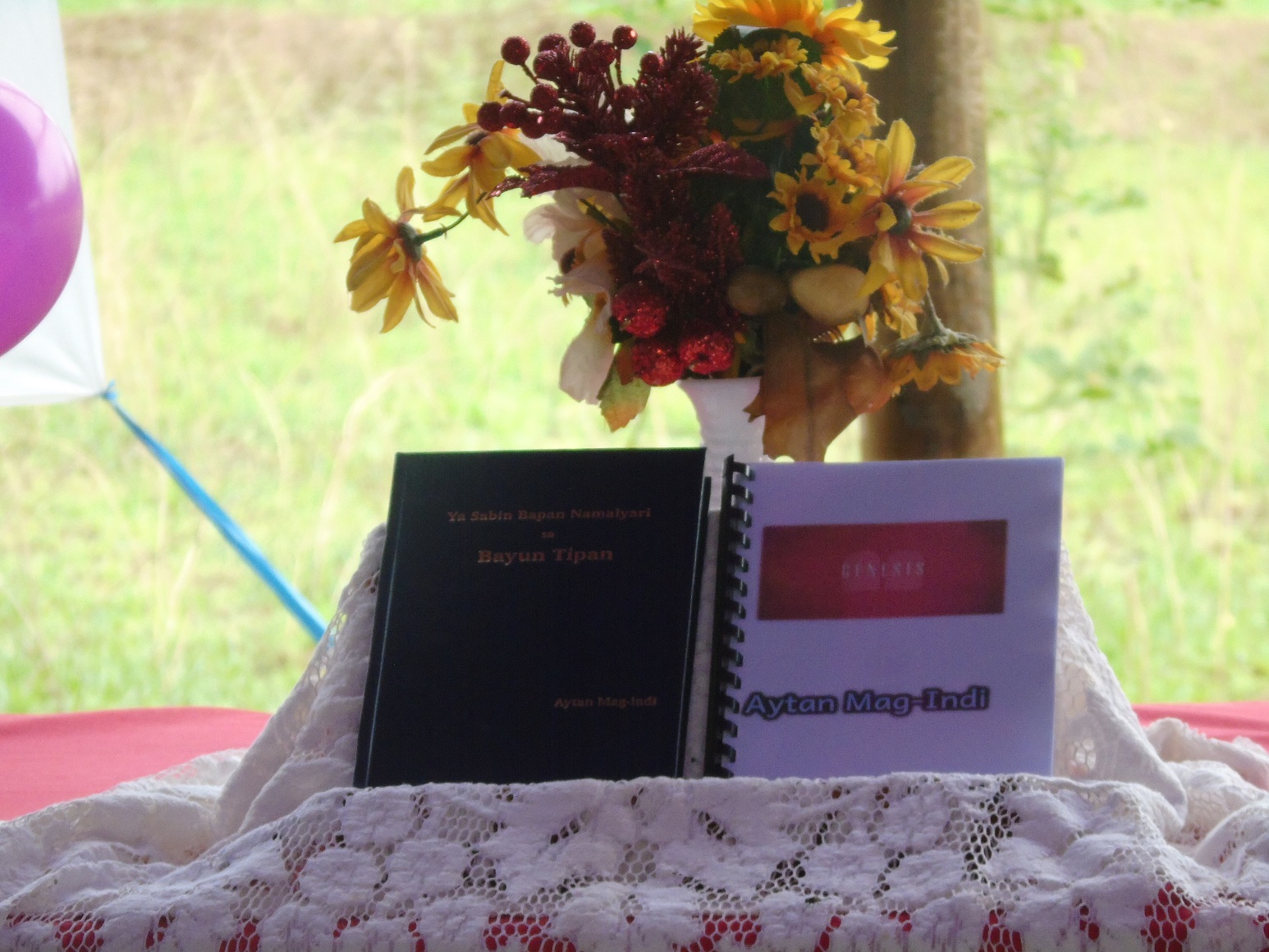
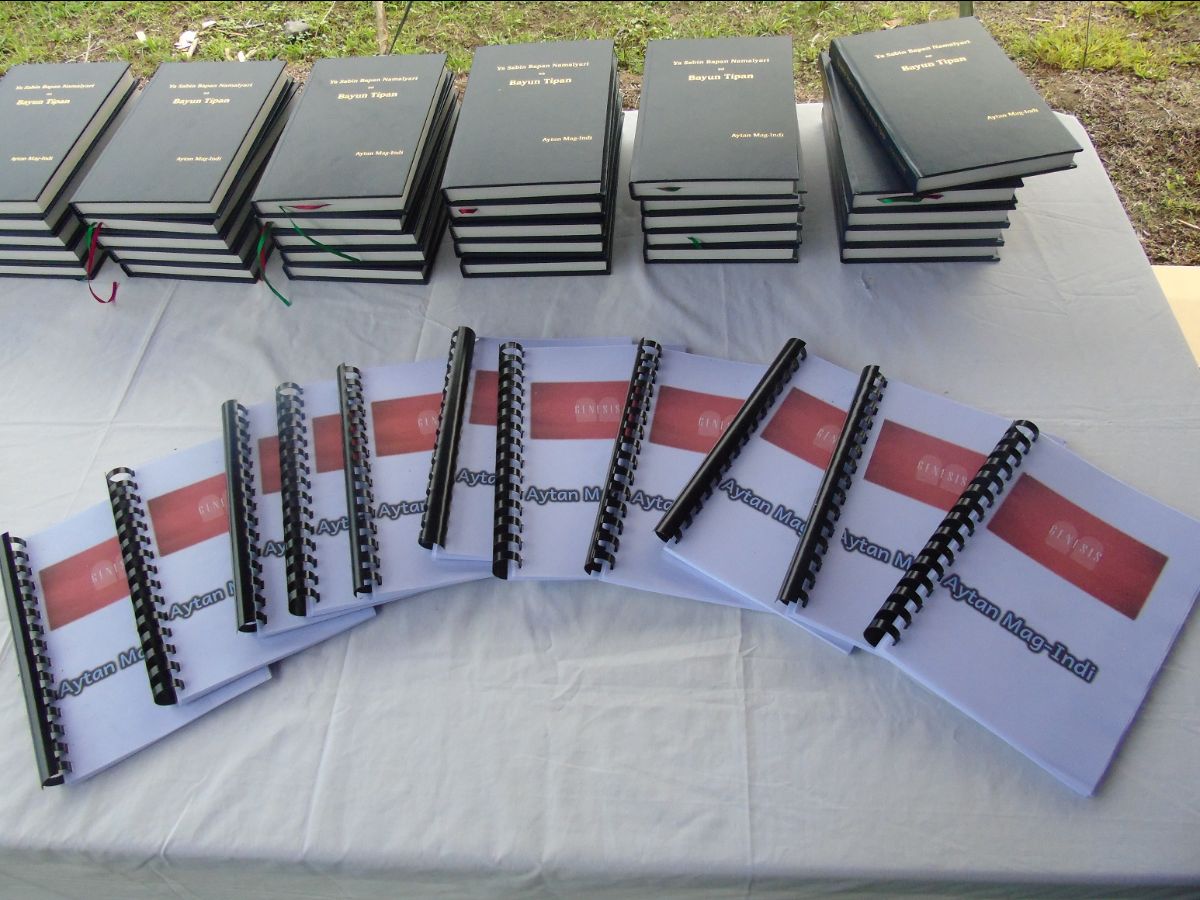
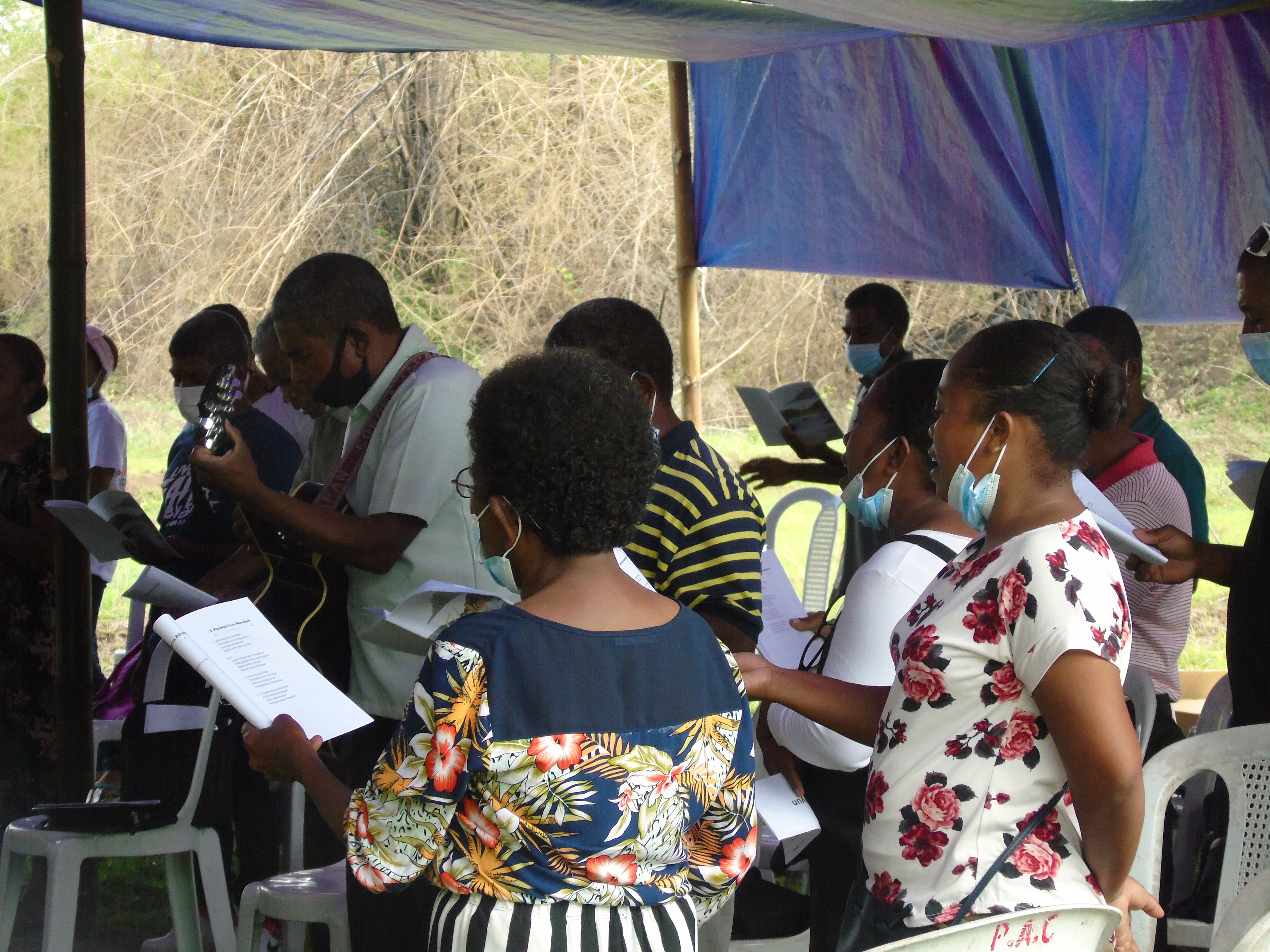
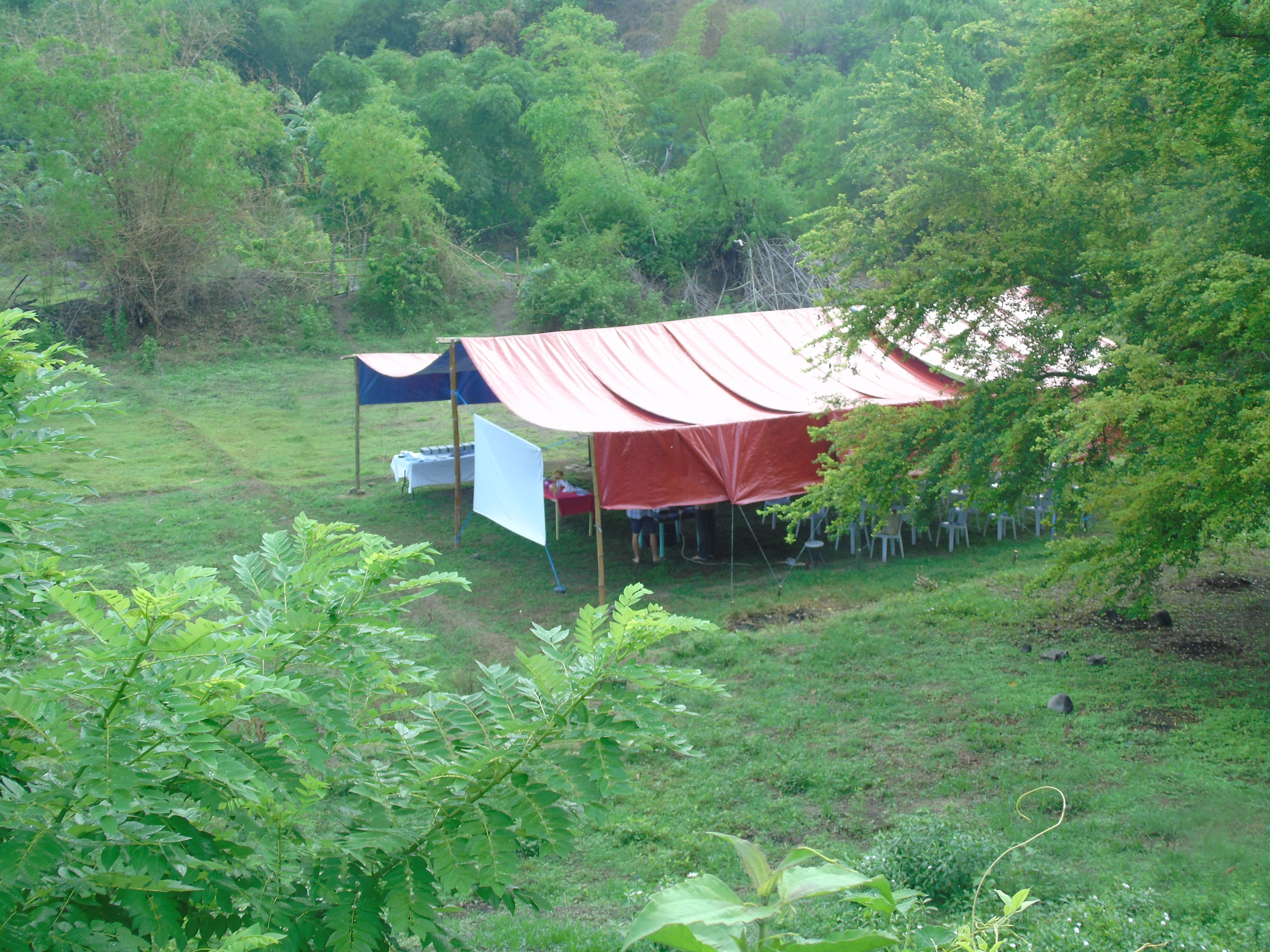
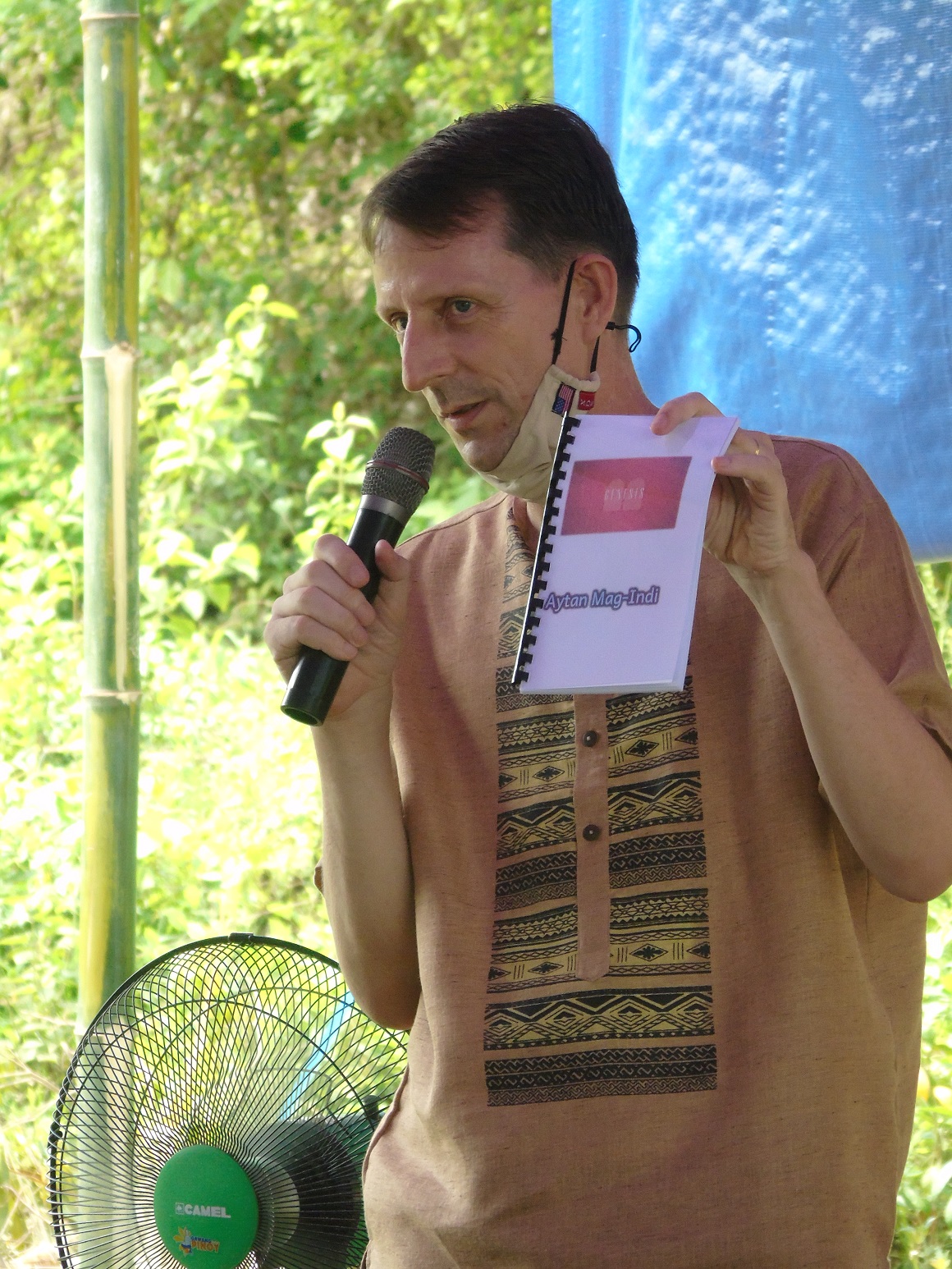
Roger Stone and the Ayta Mag-indi Mother-Tongue Translators finish their initial draft of Genesis
February 24th, 2021.
Roger Stone and a team of Ayta Mag-indi mother-tongue translators have finished drafting the book of Genesis. They used TBTA to produce the initial draft, and then they edited that draft into a presentable first draft. Roger timed the translators as they edited each chapter, and they spent a total of 52.7 hours editing TBTA's draft into a presentable first draft. Genesis has 1,533 verses, so the translators averaged 29 verses/hour. When mother-tongue translators manually draft a historical narrative such as Genesis, they typically average 5 or 6 verses/hour. So using the traditional approach to Bible translation, drafting Genesis would take between 250 and 300 hours. Therefore TBTA's draft saved this team of translators approximately 200 hours of work during the drafting stage for this book. Roger and the team will now do the usual team check, community check, and consultant check, and then publish the book of Genesis. The picture below shows Roger and several Ayta Mag-indi pastors reviewing the text.
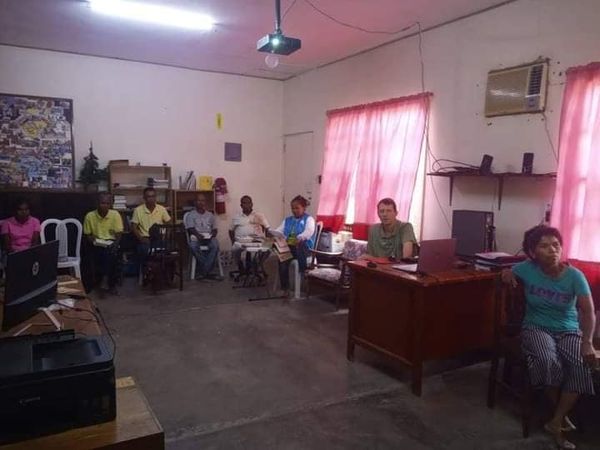
Roger Stone uses All the Word's Software System to Translate Ruth and Jonah into Ayta Mag-indi
August, 2020.
Roger Stone, a member of Wycliffe Bible Translators, has been working in the northern Philippines for more than ten years with two people groups: the Ayta Mag-indi and the Ayta Abellen. Early this year, he and the two teams of mother-tongue translators finished translating the New Testament into both languages. In June Roger started modifying our Tagalog lexicon and grammar to accommodate Ayta Mag-indi. Then TBTA produced drafts of Ruth and Jonah. Roger asked the mother-tongue translators to edit the computer's drafts into presentable first drafts, and, on average, they edited 24 verses per hour. When experienced mother-tongue translators manually produce presentable first drafts of historical narratives such as Ruth, they typically produce five to six verses per hour. So using TBTA significantly increased the productivity of the mother-tongue translators. Now Roger and the translators are using TBTA to produce a draft of Genesis in Ayta Mag-indi. Their testimonial video can be seen below.
Roger and Pastor Dino's Testimonial Video
A Bible Translation Organization in the Philippines Evaluates our Software's Tagalog Translations
December, 2019 and January, 2020.
Late last year and early this year, David Duncan and an organization named OneBook partnered with The Translators Association of the Philippines (TAP) to evaluate the Tagalog drafts of Ruth and Philippians produced by our software. David arranged for a team of TAP members to take the drafts of Ruth and Philippians through a team check, community check, and consultant check. A report summarizing the results of this process is available below. In brief, the team found that by using TBTA's drafts, the drafting stage was reduced by 93%, and the consultant checking stage was reduced by 50%. Projections indicate that this approach could reduce the time and cost of a translation project by 35 to 40%. One of TAP's translation teams is now working with Tod Allman to modify the Tagalog lexicon and grammar to accommodate Subanen, a language spoken in the southern Philippines. Later this year we'll do a similar experiment, and the Subanen translators will evaluate TBTA's drafts of Ruth and 1 John.
Summary of TAP's Evaluation of TBTA's Tagalog Drafts
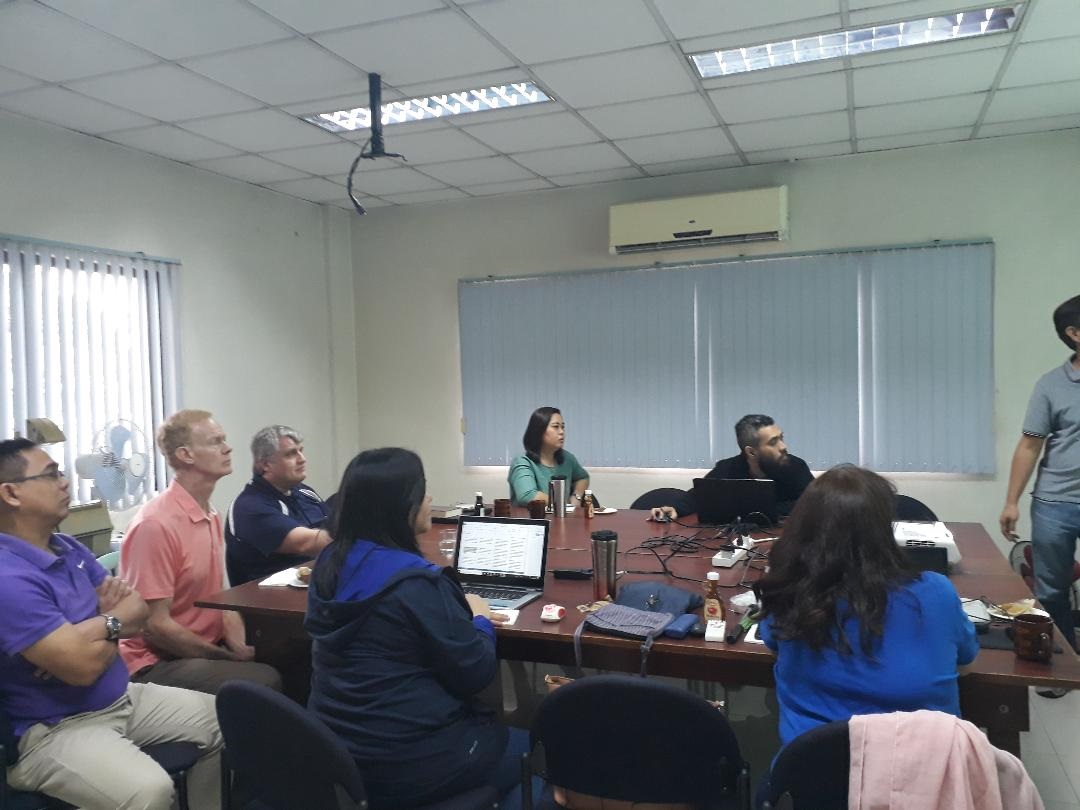
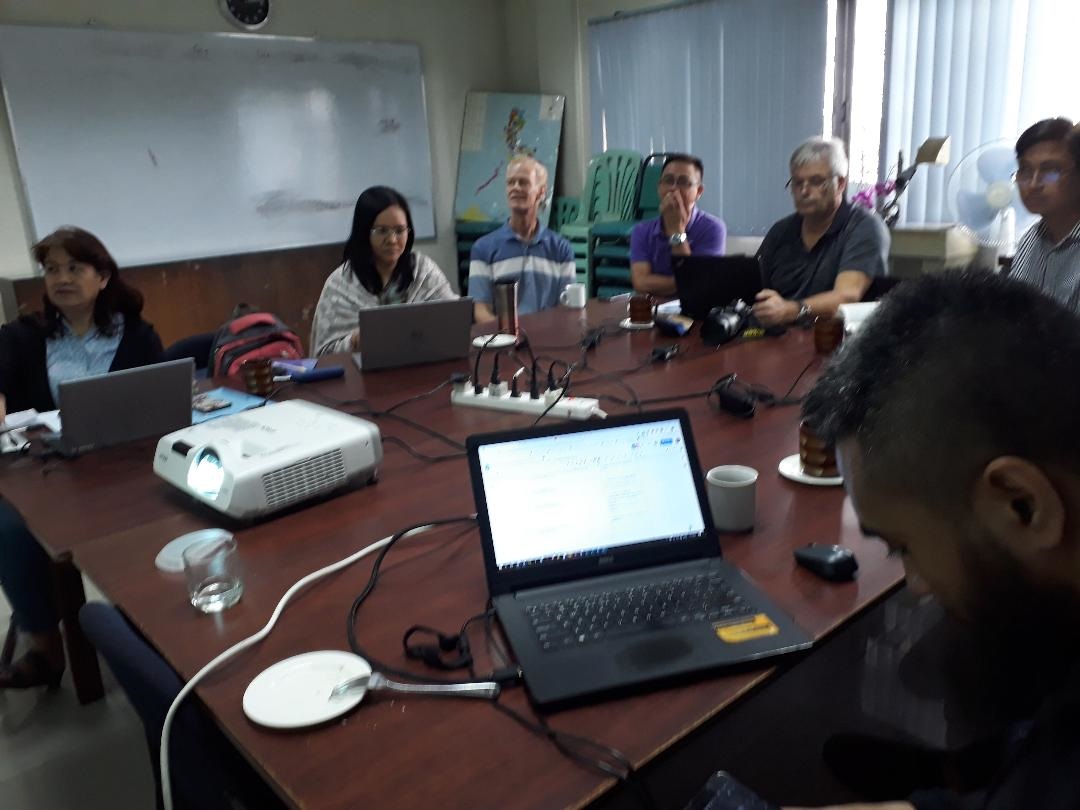
A Presentable First Draft of 2 Samuel in Tagalog after just 11 hours of editing
December, 2019.
In early December Stephen Beale, Richard Denton, and Tod Allman completed the semantic analysis of 2 Samuel. Tod and Ephraim Rey then spent an afternoon entering all of the proper names that are used in that book. Our software then produced a draft translation of 2 Samuel in Tagalog, and Ephraim was able to edit that draft into a presentable first draft in 11 hours and 5 minutes. Producing a presentable first draft of 2 Samuel the traditional way would require somewhere between 150 and 250 hours, so our software system drastically reduces the time, cost, and work required to translate these books. Our team of Tagalog editors is now polishing the text to make it publishable, and then we'll distribute it in illustrated books, phone apps, and videos. A document with the edited Tagalog text and a table showing the number of minutes Ephraim spent editing each chapter can be seen by clicking the button below. That document also contains the unedited English draft of 2 Samuel produced by our software.
Summary of Timed Experiment with 2 Samuel
A Presentable First Draft of Jonah in Tagalog after about 1 hour of editing
September, 2019.
This summer Corban Phillips, Daniel Hickox, and Richard Denton completed the semantic analysis of Jonah. Tod Allman and Ephraim Rey then spent less than an hour entering all of the proper names that are used in that book. Our software then produced a draft translation of Jonah in Tagalog, and Ephraim was able to edit that draft into a presentable first draft in 65 minutes. We define a presentable first draft as one that doesn't contain any grammatical errors, communicates the message accurately, clearly, and completely, and could be read to church audiences and everyone would easily understand it. The text certainly requires more editing and polishing by mother-tongue speakers before it's publishable, but it is now presentable. Producing a presentable first draft of Jonah the traditional way would typically take 3 or 4 days, perhaps a week. So our software system drastically reduces the time, cost, and work required to translate these books. A document with the Tagalog text and a table showing the number of minutes Ephraim spent editing each chapter can be seen by clicking the button below. That document also contains the unedited English draft of Jonah produced by our software. Another document containing all of Ephraim's corrections highlighted in red can be seen by clicking the second button below.
Tod Allman visits a remote Igorot village
March 24th, 2019.
Tod Allman and his family had the privilege of visiting a remote Igorot village in the northern part of the Philippines (16.12676, 121.39206 in Google Earth). In that village there is electricity, but no cell phone coverage, no internet, and no running water. Several New Tribes missionaries were taking supplies to the village by helicopter, and Tod and his family were able to ride along. So Tod loaded his wifi hotspot with all the Bible books that we've translated, the Jesus film, and several other videos about the life of Christ. Then during the Sunday morning church service, the pastor let Tod describe how the people could connect their phones to the hotspot and download the Bible book apps to their phones. Sixteen people at the service had smart phones, and all of them downloaded our illustrated translation of Genesis. Nine of them downloaded the Jesus film. The people also downloaded a variety of our translations and the other videos. The people were amazingly friendly, and they were genuinely appreciative of the Bible books. It was a very good time. You can see a video of the trip by clicking the button below.
Video of Tod's Visit to an Igorot Village
A Presentable First Draft of Joshua in Tagalog in less than 11.5 hours of editing
January, 2019.
Late last year Stephen Beale, Richard Denton, and Tod Allman completed the semantic analysis of Joshua. Tod and Ephraim Rey then spent an afternoon entering all of the proper names that are used in that book. Our software then produced a draft translation of Joshua in Tagalog, and Ephraim was able to edit that draft into a presentable first draft in less than 11.5 hours. We define a presentable first draft as one that doesn't contain any grammatical errors, communicates the message accurately, clearly, and completely, and could be read at churches and everyone would easily understand it. The text certainly requires more editing and polishing by mother-tongue speakers before it's publishable, but it is now presentable. Producing a presentable first draft of Joshua the traditional way would require somewhere between 150 and 300 hours, so our software system drastically reduces the time, cost, and work required to translate these books. A document with the Tagalog text and a table showing the number of minutes Ephraim spent editing each chapter can be seen by clicking the button below. That document also contains the unedited English draft of Joshua produced by our software. Another document containing all of Ephraim's corrections highlighted in red can be seen by clicking the second button below.
A Presentable First Draft of Exodus 1-20 in Tagalog in less than 14 hours
November, 2018.
This past summer Stephen Beale and Tod Allman completed the semantic analysis of Exodus chapters 1 through 20. Tod and Ephraim Rey then spent an afternoon entering all of the proper names that are used in those chapters. Our software then generated a draft of those chapters in Tagalog, and Ephraim was able to edit that draft into a presentable first draft in less than 14 hours. This draft doesn't contain any grammatical errors, communicates the message clearly, and could be read at churches and everyone would easily understand it. The text certainly requires more polishing by mother-tongue speakers before it's publishable, but it is now presentable. Producing a presentable first draft of Exodus 1-20 the traditional way would require somewhere between 120 and 220 hours, so our software system drastically increases the productivity of experienced mother-tongue translators. A document with the Tagalog text and a table showing the number of minutes Ephraim spent editing each chapter can be seen by clicking the button below. The document also contains the unedited English draft of Exodus 1-20 produced by our software. Another document containing all of Ephraim's corrections highlighted in red can be seen by clicking the second button below.
Summary of Timed Experiment with Exodus 1-20
Computer's Tagalog Draft of Exodus 1-20 with corrections in Red
Richard Denton presents a paper at the American Scientific Affiliation
July 27th to 30th, 2018.
Richard Denton attended the American Scientific Affiliation conference in Hamilton, Massachusetts. This is a conference for Christians who are scientists. Richard likes these conferences because of the thoughtful perspectives he finds about integrating science and faith. Richard gave a presentation about the ministry of All the Word. The slides and audio for his talk are available below.
A Significant Enhancement to our Software - Importing Lexicons, Gleaning Grammars
May, 2018.
In the past, building a lexicon and a thorough grammar for a language took approximately one year using our software. But we recently developed a new technique to drastically reduce that time. Rather than entering all the words and building all the rules manually, we now give our mother-tongue translators a series of documents. The documents contain short simple sentences that we ask them to translate, and then we lightly annotate their translations. The software then scans through those sentences, and gleans the necessary vocabulary and grammar rules. A video demonstrating this new technique is available below.
A Significant Enhancement to our Software - Multiple Translations for each Language
March, 2018.
When missionaries begin translating the New Testament into a language, one of their first tasks is to choose their audience. They generally choose the adults within that people group who have a typical education. The missionaries then work for the next 10 to 20 years to produce a New Testament that will be easily understood by that particular audience. The missionaries can't possibly produce additional translations for the children, or for less educated adults, or more highly educated adults; the missionaries are only able to produce one translation for their selected audience. But there are always multiple audiences within each people group, and every one of those audiences deserves God's entire Word. In order to address this need, we recently enhanced our software so that it will produce translations for up to five different audiences in each language. For each of the five audiences, the user is able to specify which complex vocabulary will be included in the translation, and how much explanatory information will be included. For Tagalog, we're planning to produce four translations: one for churched adults, one for unchurched adults, one for churched children, and one for unchurched children. The translations for the adults will include more complex vocabulary, and the translations for the unchurched audiences will include extra explanatory information to make the texts easier to understand for people who are unfamiliar with Jewish culture during biblical times. An example produced by our software showing Esther 4:16 in English for these four audiences is shown below. The New International Version for this verse is shown in the first column so that you can compare it with our four translations. The vocabulary differences are highlighted in red, and the explanatory information is highlighted in blue. The explanatory information generally comes from a translation developed by Ellis Deibler called Translation for Translators, and it can be found here: www.ebible.org/t4t.
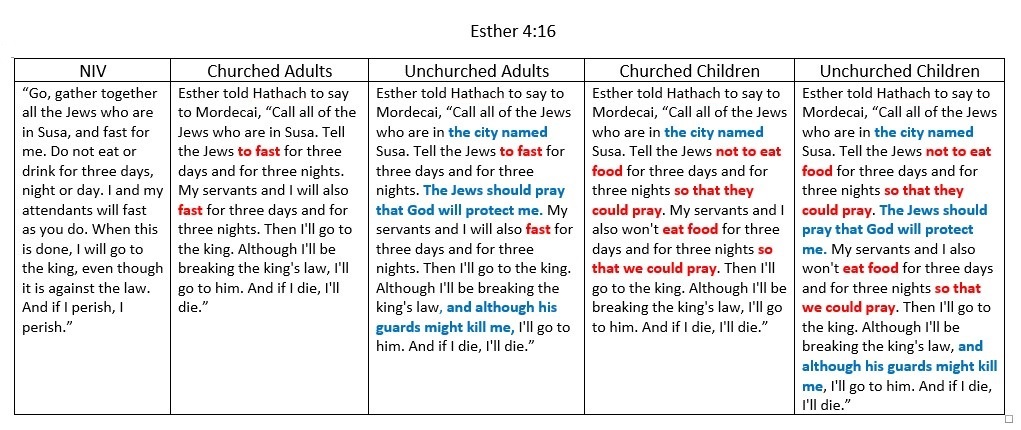
A Presentable First Draft of the book of Judges in Tagalog in less than 18 hours
January, 2018.
Late last year Stephen Beale and Tod Allman completed the semantic analysis of the book of Judges. Tod and Ephraim Rey then spent an afternoon entering all of the proper names that are used in that book. Our software then generated a draft of the entire book in Tagalog, and Ephraim was able to edit that draft into a presentable first draft in less than 18 hours. This draft can be read at churches, and everyone would easily understand it. The text certainly requires more polishing by mother-tongue speakers before it's publishable, but it is now presentable. Producing a presentable first draft of Judges the traditional way would require somewhere between 100 and 200 hours of work, so our software system drastically increases the productivity of experienced mother-tongue translators. If we had the other historical narrative books of the Bible analyzed, our software could produce translations of those books also. A document with the Tagalog text and a table showing the number of minutes Ephraim spent editing each chapter can be seen by clicking the button below. The document also contains the unedited English draft of Judges produced by our software. Another document containing all of Ephraim's corrections highlighted in red can be seen by clicking the second button below.
Jeremiah Chung publishes a paper in the Chinese edition of Wycliffe Bible Translators' "In Other Words."
August 11th, 2017.
Jeremiah Chung wrote a paper entitled "Technology for Missions," and it was published in the Chinese edition of Wycliffe's journal "In Other Words." The article discusses innovative methodologies for improving the Bible translation process, including All the Word's approach, and also discusses the challenges and opportunities for engaging the Chinese diaspora through several of Jeremiah's other projects such as Gosp4el. You can read Jeremiah's article here.
Richard Denton presents a paper at the American Scientific Affiliation.
July 29th, 2017.
On the weekend of July 28-31, 2017, Richard Denton attended the annual meeting of the American Scientific Affiliation (ASA), an organization of Christian scientists eager to examine issues of faith and science. Richard was able to talk to about 15 to 20 people about All the Word and our work. On July 29th, Richard presented a poster entitled, "Eradicating Bible poverty around the globe." The poster talked about our goal to bring the entire Bible to all people. In addition to describing our translation system, the poster mentioned our new use of smart phone apps that allow free mass distribution.
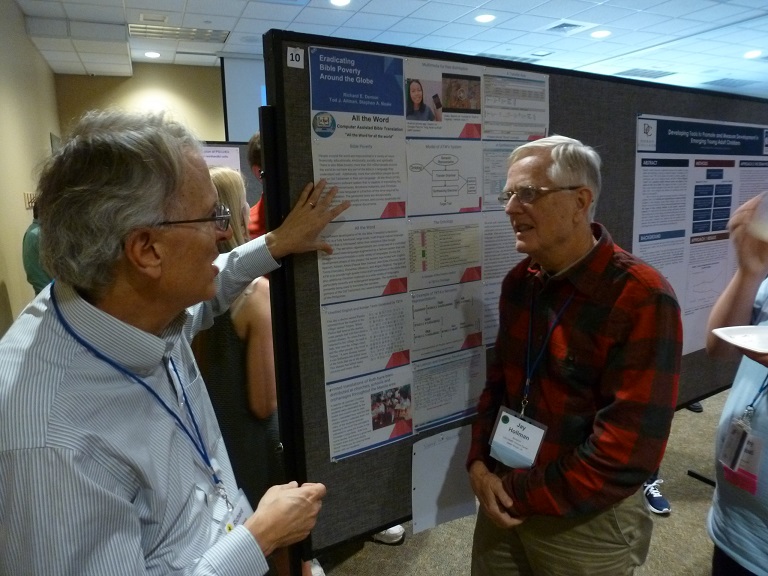
Tod Allman presents a paper at The Philippines' 13th National Natural Language Processing Research Symposium.
April 21st, 2017.
Tod Allman presented a paper entitled "An Analysis of the Required Modifications when Converting a Computational Tagalog Grammar into an Ayta Mag-Indi Grammar" at the 13th National Natural Language Processing Research Symposium held at the University of the Immaculate Conception in Davao, Philippines. The paper described how the Tagalog lexicon and grammar were modified to accommodate Ayta Mag-Indi, another Malayo-Polynesian language spoken in the Philippines.
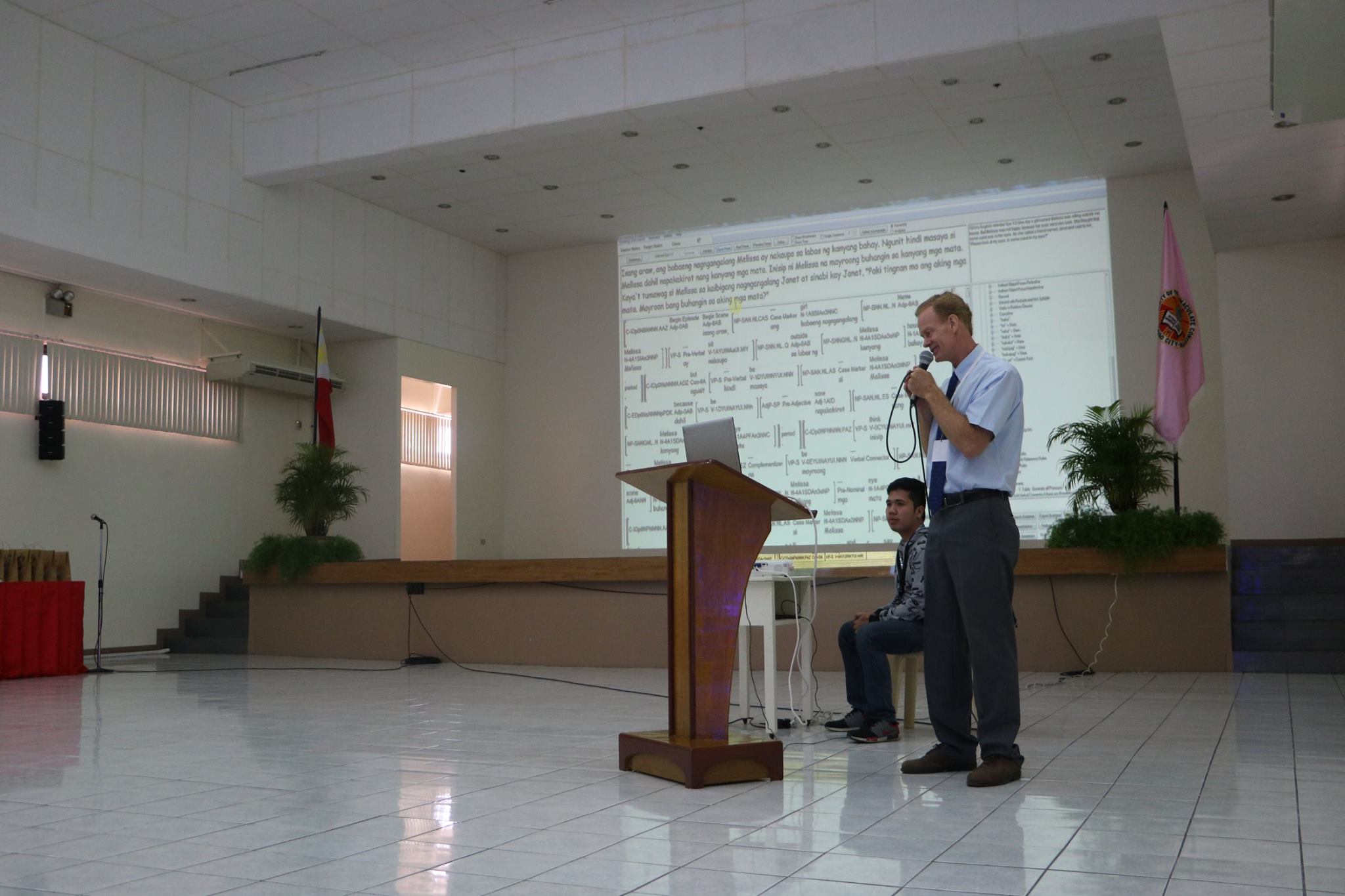
Jeremiah Chung represents TBTA at a missions conference in Europe.
April 3rd, 2017.
Jeremiah Chung represented TBTA at a missions conference in Europe that explored new techniques for applying technology to missions. More than 400 people representing over 100 missions organizations attended the conference. Some interesting facts were shared during this conference:
1) Most adults and young people in the world have access to a smart phone, even if they are poor.
2) Most people access the internet through smart phones rather than computers, and through mobile apps rather than a browser.
3) More people read the Bible on their phones rather than books or websites.
Each organization was invited to give a one minute presentation describing their mission, and Jeremiah's presentation won first place. You can see a video of his presentation by clicking the button below.
TBTA's First Fruit
November 2016.
Tod Allman and Ephraim Rey spent approximately two years developing a Tagalog lexicon and grammar. They began by working through the book of Ruth, then Esther, five chapters of Luke, the first half of Daniel, and they hope to finish Genesis by the end of this year. Ephraim edited the computer generated draft of Ruth in order to make it publishable, and then they put the text into the pictures provided by Free Illustrated Bible. We had 500 copies printed, and we're excited to begin distributing them at orphanages, special schools, churches, and prisons. We know that Ruth is a small book and will probably not lead anyone to Christ directly, but this is just the beginning. We hope to produce many more books of the Bible in Tagalog and the other languages spoken in the Philippines.
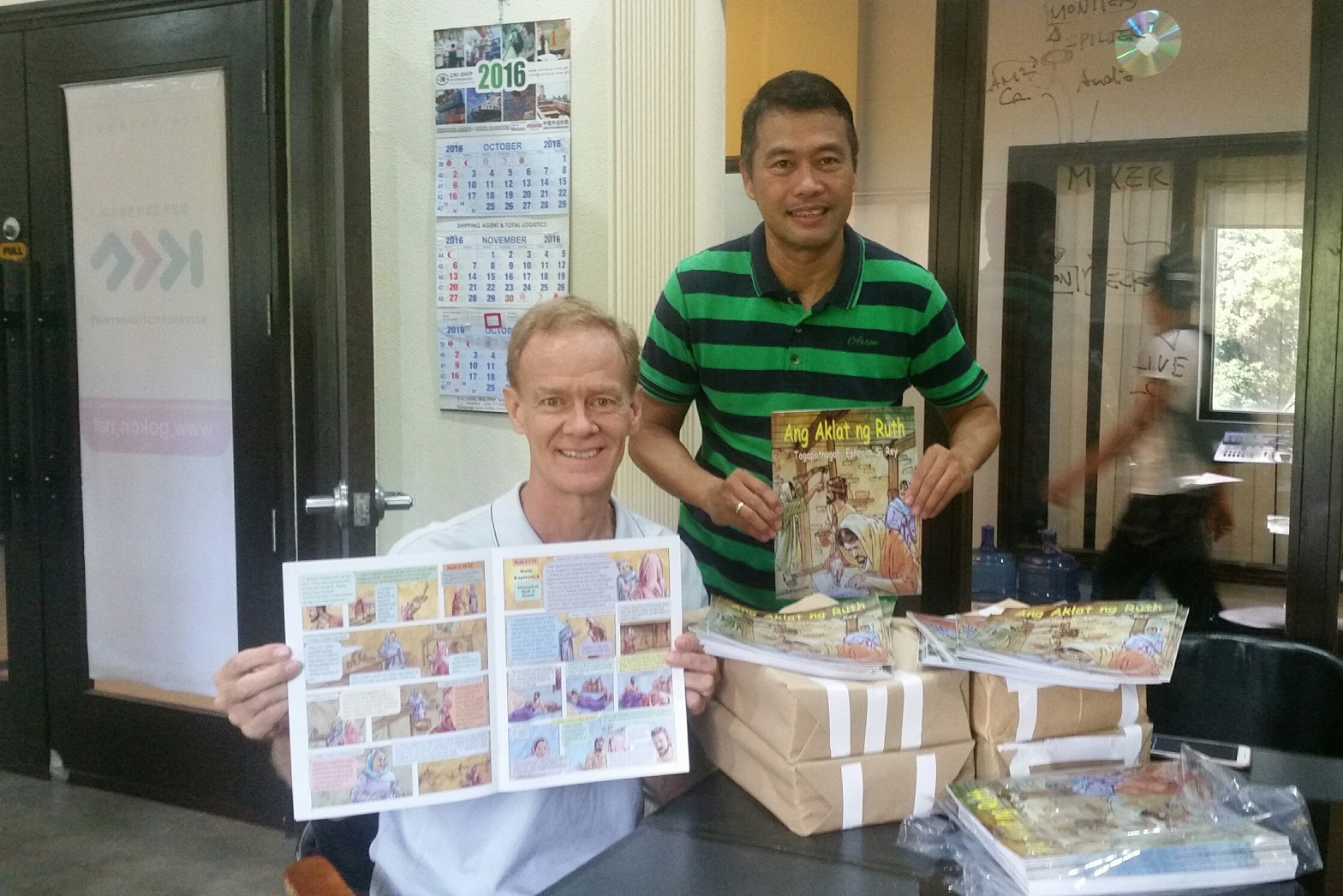
Tod Allman presents a paper and demonstrates Linguist's Assistant at The Philippines' 12th National Natural Language Processing Research Symposium.
April 22nd, 2016.
Tod Allman presented a paper entitled "Linguist's Assistant: Modifying a Tagalog Lexicon and Grammar to Accommodate Ayta Mag-Indi" at the 12th National Natural Language Processing Research Symposium held at Silliman Univerity in Dumaguete, Philippines. The paper demonstrated how the Tagalog lexicon and grammar can easily be modified to produce high quality translations in Ayta Mag-Indi, another Malayo-Polynesian language spoken in the Philippines. The workshop showed the participants how to modify the Ayta Mag-Indi grammar to produce Tagalog texts.
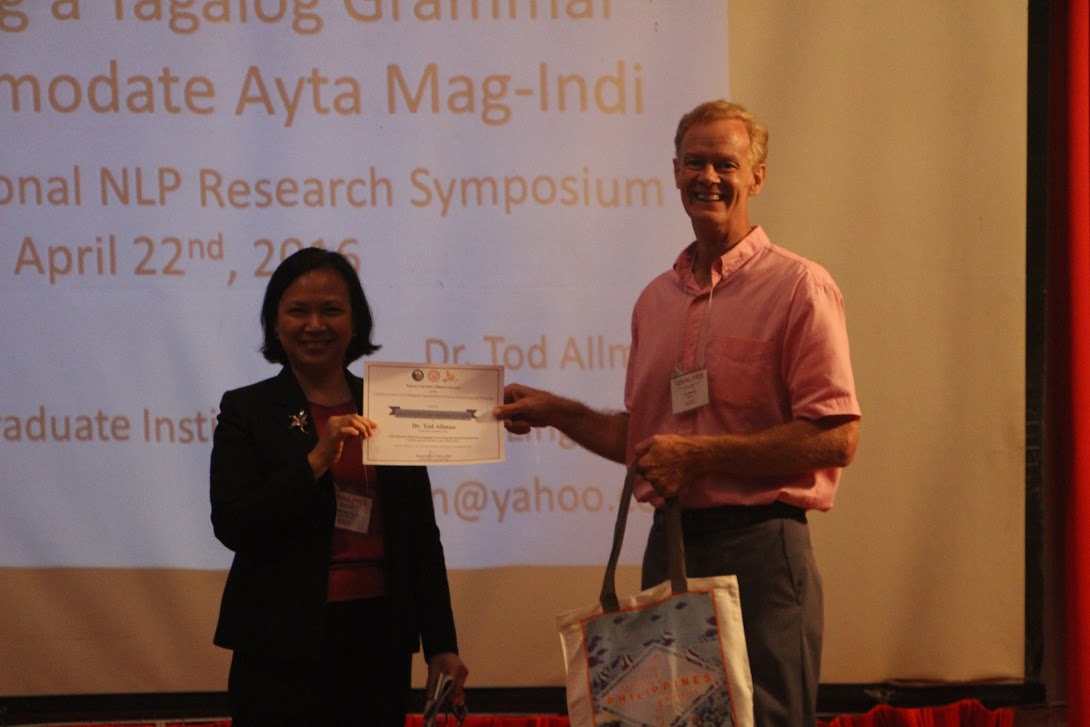
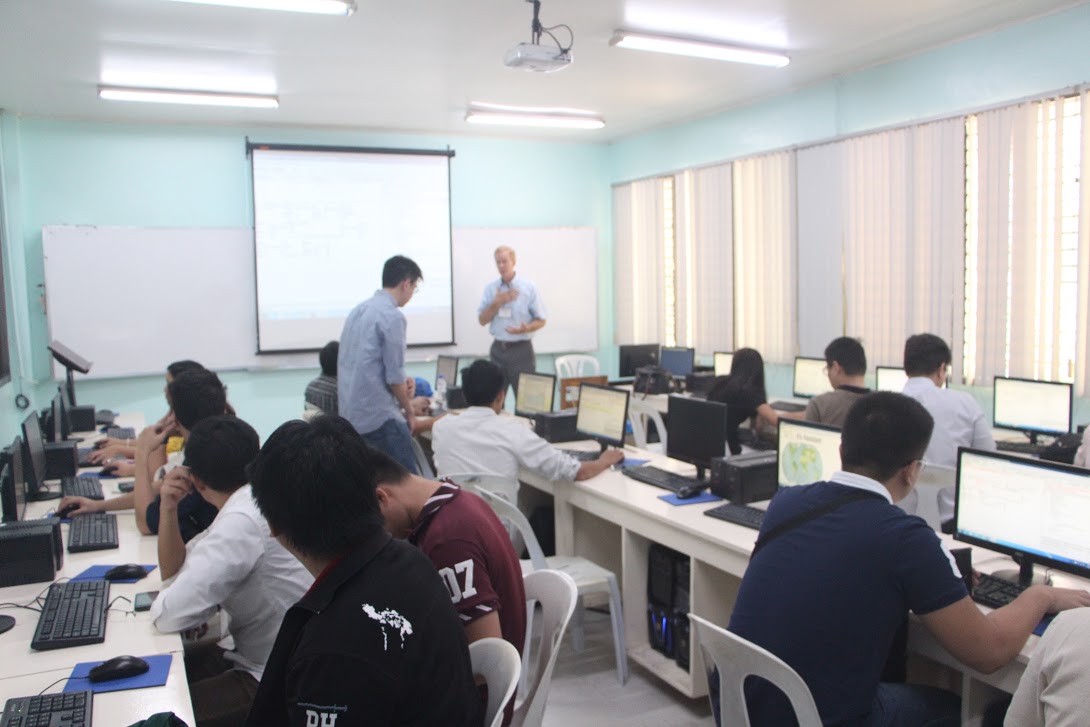
Matthew Rodatus represents TBTA at the Code for the Kingdom Hackathon in Denver, Colorado.
November 6th to 8th, 2015.
Matthew Rodatus represented TBTA at a "hackathon" hosted by Code for the Kingdom. "Hackathons" are events where computer scientists gather to develop computer programs designed for advancing God’s kingdom. At the beginning of this conference, project members were given an opportunity to present their work proposals, and then unaffiliated programmers selected a particular team and helped develop their project. TBTA attracted several top-notch programmers and designers. They developed a new, up-to-date interface for building our semantic representations - the unambiguous representations of the Bible's message that our software uses as the starting point to accurately translate the Bible. At the end of the conference, each team had an opportunity to present their project and the work they did during the hackathon weekend. Then a panel of judges evaluated the projects, and TBTA's team won the best overall project started at the hackathon. You can read more about the Hackathon at their website: http://codeforthekingdom.org/denver-hackathon-2015.html.
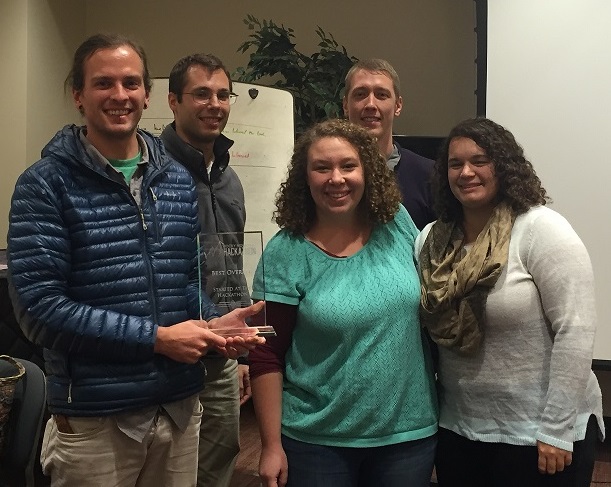
Matthew Rodatus joins TBTA as a Software Consultant.
October 1st, 2015.
Matthew has been a professional software engineer for over ten years. Though he hasn't studied linguistics formally, he loves linguistics and worked for many years with Dr. Stephen Beale on natural language processing. He received his Bachelor of Science in Computer Science in 2006, and immediately took a job at Microsoft in Redmond, WA. After a successful time there, he returned to Frederick, MD where he resides with his wife and two daughters, and works as a Senior Software Engineer for a local software company. Matthew is enthusiastic about working on the team engineering the TBTA software, and he looks forward to learning more linguistics along the way and helping in the TBTA mission in any way he can. Matthew wants to see the whole Bible translated accurately into the thousands of languages that don't have it so that every culture can see the light of the knowledge of the glory of God in the face of Jesus Christ (2 Corinthians 4:6) -- in their native tongue.
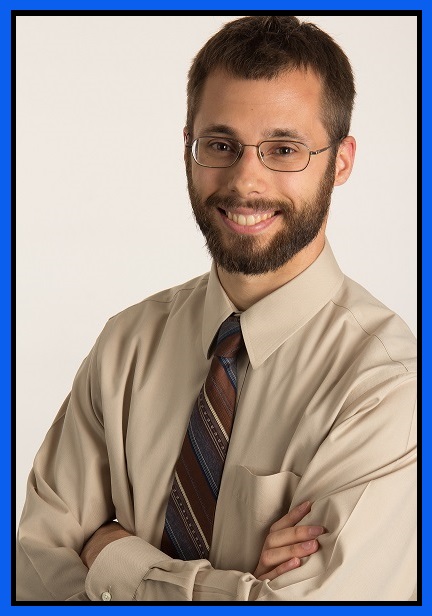
Dr. Jeremiah Chung joins TBTA as a Consultant.
May 1st, 2015.
Jeremiah Chung has served with Wycliffe Bible Translators - Hong Kong for more than twenty years. He guided a team of mother-tongue translators on Santo Island in the South Pacific, and they translated the New Testament into Merei. Jeremiah's vision is now to re-engineer the Bible translation process using the latest technology available, and to engage the laity, particularly Asian diaspora. He will be developing both formal and informal relationships between TBTA and other organizations and schools interested in Bible translation. Jeremiah has been seconded from Wycliffe Bible Translators to TBTA for one year beginning in May, 2015.
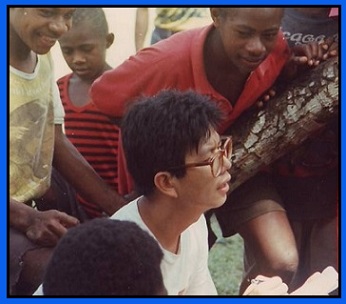
Tod Allman presents a paper and demonstrates Linguist's Assistant at The Philippines' 11th National Natural Language Processing Research Symposium.
April 24th, 2015.
Tod Allman presented a paper entitled "Linguist's Assistant: Gleaning a Tagalog Lexicon and Grammar from a Small, Lightly Annotated Corpus" at the 11th National Natural Language Processing Research Symposium held at National Univerity in Manila. The paper demonstrated the progress being made with the Tagalog grammar, and also presented the results of experiments that have been performed to determine the quality of the Tagalog translations produced by LA. The experiments indicate that when experienced mother-tongue translators use the computer generated translation, their productivity is more than tripled without any loss of quality.
Tod Allman presents a paper and demonstrates Linguist's Assistant at the 12th Philippine Linguistics Congress.
November 27th, 2014.
Tod Allman presented a paper entitled "Linguist's Assistant: Gleaning Malayo-Polynesian Grammars from Small, Lightly Annotated Corpora" at the 12th Philippine Linguistics Congress held at the Univerity of the Philippines in Diliman. The paper demonstrated a new technique we've developed to very rapidly glean substantial portions of a target language's grammar from lightly annotated translations of sample sentences. This new technique significantly reduces the amount of time and effort required to develop a grammar for a language.
Tod Allman and his family move to the Philippines.
August 1st, 2014.
Tod and his family moved to Manila for a three year term so that he could develop lexicons and grammars for several of the languages there. He hopes to use TBTA's software to generate initial draft translations of parts of the Bible in as many languages as possible.
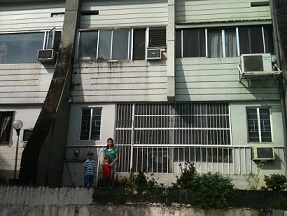
Stephen Beale presents a paper at the 52nd annual meeting of the Association for Compuational Linguistics (ACL).
June 26th, 2014.
Stephen Beale recently attended the ACL workshop, "ComeputEL: The use of computational methods in the study of endangered languages." Researchers from the fields of Linguistics and Computational Linguistics met to discuss new strategies and computational tools that could help endangered languages. His paper, "Time to Change the 'D' in 'DEL'" discussed the importance and benefit of a deeper description of these languages as opposed to the more widespread practice of primarily data-oriented recordings and transcriptions of texts. He demonstrated how Linguist's Assistant can be used to grammatically and morphologically describe languages in an efficient manner.
Tod Allman teaches a class at De La Salle University in the Philippines.
January to April, 2014.
Tod Allman and his family are in the Philippines for four months (January through April, 2014). Tod is teaching graduate computer science students how to use LA, and is also working with several linguistics students to build lexicons and grammars in LA for two languages spoken in the Philippines. He presented a paper entitled "Toward an Optimal Multilingual Natural Language Generator: Deep Source Analysis and Shallow Target Analysis" at the 10th National Natural Language Processing Research Symposium (10th NNLPRS), and another paper entitled "Linguist's Assistant: In Search of the Source" at the 14th Philippine Computing Science Congress (PCSC '14). He will be presenting a four day workshop to linguistics students at the Univerity of the Philippines in Diliman so that they will be able to use LA to document several languages during their field projects. We hope these projects will provide a platform for describing many more languages spoken in the Philippines.
Tod Allman teaches a class at GIAL.
September to December, 2013.
Tod Allman is teaching a class at the Graduate Institute of Applied Linguistics (GIAL), a school founded by members of Wycliffe Bible Translators to prepare students for cross cultural ministries, particularly Bible translation. One of the students wrote an insightful description of how TBTA works in his blog, which you can see here.
Steve Beale teaches two classes at De La Salle University in the Philippines.
September to November, 2013.
Stephen Beale and his family are in the Philippines for three months. Steve is teaching two classes at De La Salle University, and is also leading several projects related to TBTA. He is teaching computer science students about TBTA, and leading them in a project to redesign, improve, and help make it better suited for the languages spoken in the Philippines. Steve is also working with seven linguistic students to document several languages spoken in the Philippines using TBTA. We hope these projects will serve as a springboard for describing many more languages.
Richard Denton completes the semantic analysis of Ephesians.
August 27, 2013.
Richard completed the semantic analysis of Ephesians, so we now have semantic representations for Genesis, Ruth, Esther, Daniel, Nahum, Luke, Ephesians, Philippians, and Colossians, and we're making good progress in Acts, 1 Thessalonians, and Joshua.
Richard Denton completes the semantic analysis of Colossians.
January 31, 2013.
Richard completed the semantic analysis of Colossians, so we now have semantic representations for Genesis, Ruth, Esther, Daniel, Nahum, Luke, Philippians, and Colossians. Other than the Psalms and Proverbs, the Pauline epistles are the most difficult books to analyze, so we're very thankful that Richard is making good progress with this crucial work.
Tod Allman represents TBTA Inc. at Urbana '12.
December 27 - 31, 2012.
Once every three years Intervarsity organizes a large missions conference called Urbana, and this year's conference was in St. Louis, Missouri. Approximately sixteen thousand people attendend the conference. Tod served as a representative of TBTA, and met many people who are interested in TBTA's work and mission.
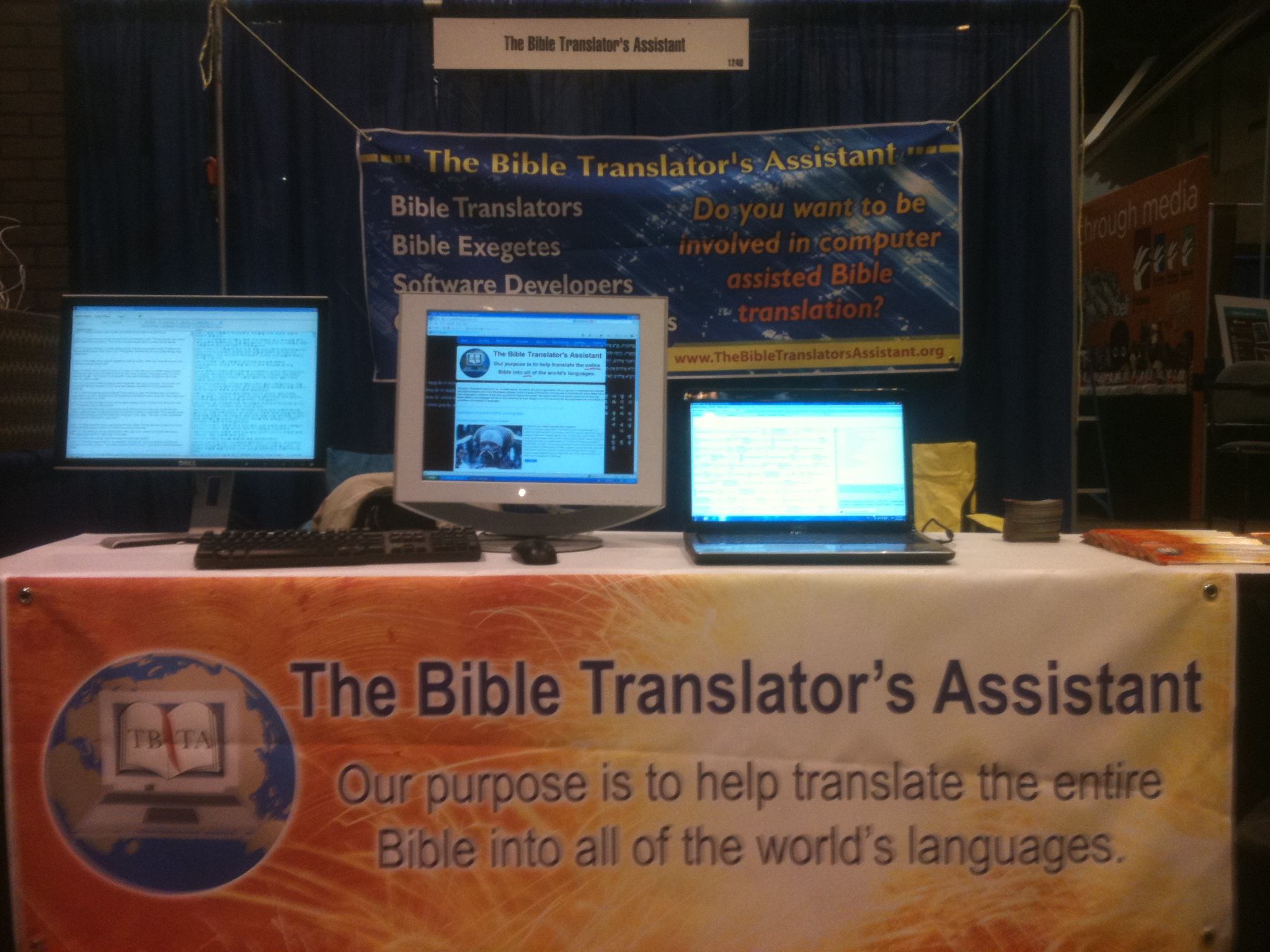
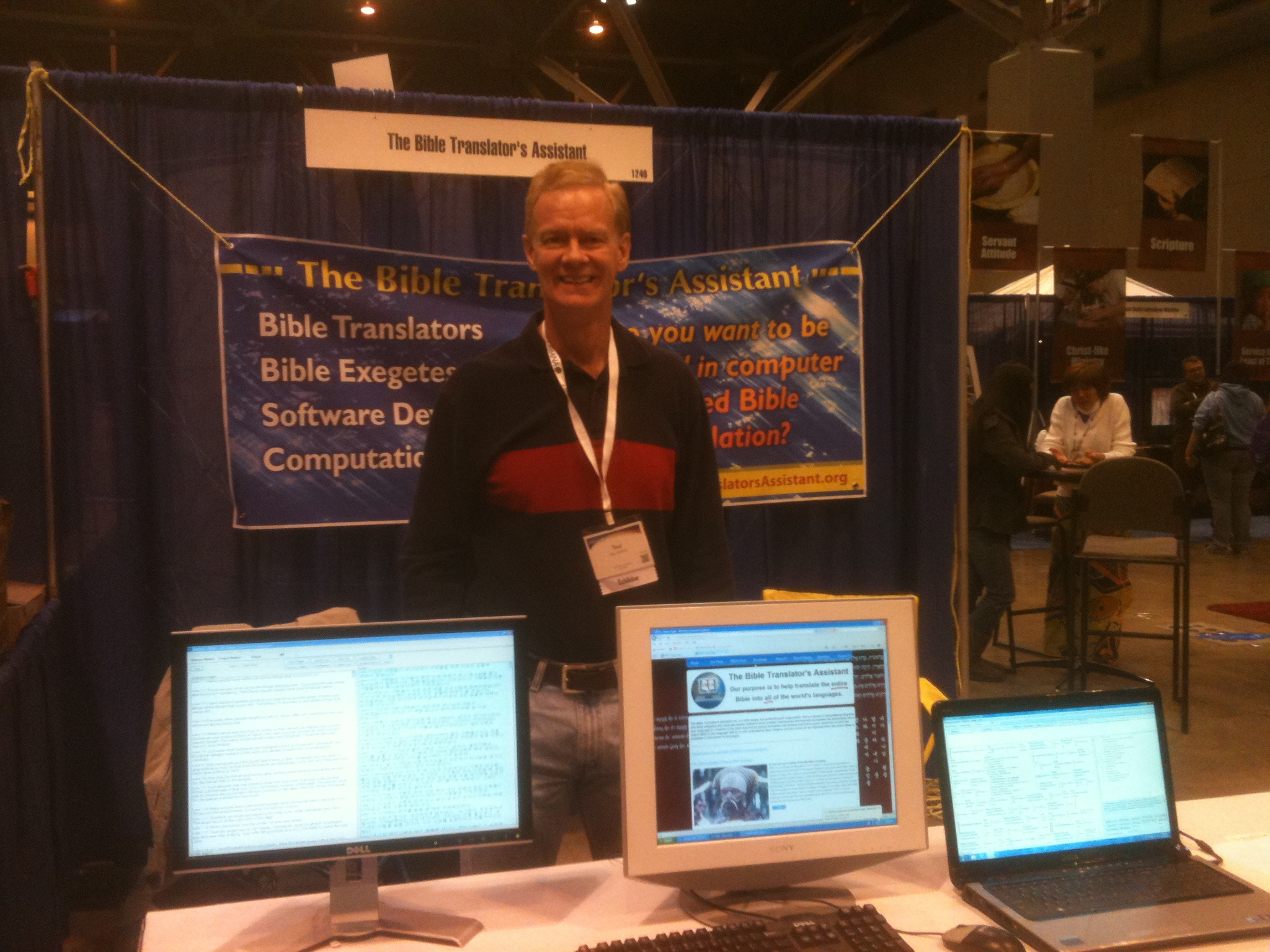
Stephen Beale and Tod Allman teach an online class at De La Salle University in Manila, Philippines.
September to December, 2012.
Steve and Tod are team-teaching a graduate class in the computational linguistics department at De La Salle University. The purpose of the class is to teach the students how to use Linguist's Assistant to document minority languages. We're hoping that eventually these students will use Linguist's Assistant to document many of the 171 languages spoken in the Philippines.
Stephen Beale teaches a class at UMBC.
September to December, 2012.
Steve is teaching a class at the University of Maryland that introduces honors students to principles in linguistic fieldword. As part of the class students will be learning to use Linguist's Assistant.
Tod Allman teaches a class at GIAL.
August to December, 2012.
Tod is teaching a class about TBTA at the Graduate Institute of Applied Linguistics (GIAL). The purpose of GIAL is to prepare students for cross cultural ministries, particularly Bible translation. This class teaches students how to use TBTA in their translation projects.
Tod Allman presents a paper and demonstrates Linguist's Assistant at INLG '12.
June 1st, 2012.
Tod presented a paper at International Natural Language Generation 2012 entitled "Linguist's Assistant: A Multilingual Natural Language Generator based on Linguistic Universals, Typologies, and Primitives." Stephen Beale and Richard Denton were co-authors. Tod also gave a demonstration of LA to many participants at the conference.
Stephen Beale spends most of March in the Philippines.
March, 2012.
Stephen spent most of March in the Philippines as a visiting professor at three universities. He gave numerous lectures, demonstrations, and tutorials about Linguist's Assistant (LA) to faculty members and students. De La Salle University is now planning to offer an on-line course so that its students can learn how to use LA in their computational linguistics courses. That course will be very similar to the course developed for GIAL by Tod Allman.
Tod Allman becomes an adjunct faculty member at GIAL.
February, 2012.
The Graduate Institute of Applied Linguistics (GIAL) is a graduate school developed jointly by Wycliffe Bible Translators and the Summer Institute of Linguistics. GIAL's primary purpose is to train students for cross cultural Bible translation. On August 26th, 2011 Tod met with the Dean and several faculty members at GIAL and gave a presentation of TBTA. Tod then proposed a new course so that the students at GIAL could learn how to use TBTA in their translation projects. Later the faculty and administration approved the course, and it will be offered in the fall of 2012.
Stephen Beale leads tutorial at IJCNLP-11 conference in Chiang Mai, Thailand.
November 8th, 2011.
Stephen lead a day-long tutorial at the International Joint Conference on Natural Language Processing in Chiang Mai,Thailand. He taught translators and natural language processing scientists the basics of Linguist's Assistant (LA). He also presented an academic paper (jointly authored with Tod) about LA/TBTA at the conference and lead a demonstration session where the conference participants saw LA in use.
Richard Denton featured in The Ivy League Christian Observer.
September 10th, 2011.
Richard gave a demonstration of TBTA to the Christian faculty and students at Dartmouth College. Later a reporter from The Ivy League Christian Observer wrote an article about Richard's work. That article appeared in the fall issue and can be seen on page 23.
Stephen Beale teaches a class at UMBC using Linguist's Assistant.
September 1st, 2011.
Stephen began teaching an Honor's College course at the University of Maryland, Baltimore County which is centered around Linguist's Assistant (LA). LA is the secular version of TBTA, which is used for academic purposes. Twenty-five students are taking the class which is oriented towards studying and describing endangered languages.
Richard Denton and Tod Allman complete the semantic analysis of Philippians.
January 18th, 2011.
Prior to working in Philippians, our semantic analysis had dealt with only the narrative portions of the Bible, and we weren't certain whether or not semantic representations could be developed for the expository portions, particularly the Pauline epistles. But our work in Philippians demonstrates that TBTA can be used to help translate the expository portions of the Bible into many different languages.
TBTA Inc. founded and granted non-profit status.
December 23rd, 2010.
Drs. Tod Allman, Stephen Beale, and Richard Denton founded The Bible Translator's Assistant Inc. in July of 2010. They then applied for non-profit status which was granted on December 23rd, 2010.


